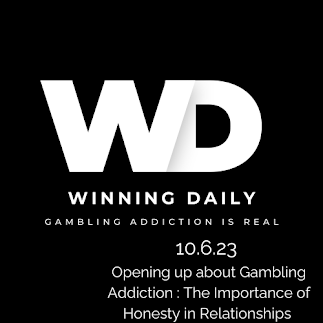Recently I had released a blog regarding gambling addiction and relationships, so I figured I would take a few weeks to learn about the other side and how our significant others are affected by this addiction as well. So, if you’re in a relationship or close friends with someone who is a gambling addict, this blog is for you.
If someone close to you is struggling with gambling, we usually hide it because we’re afraid you will think less of us and not want to help us. Here are some signs to watch out for:
1. Dishonesty: It’s not only the lies, but also the manipulation and accusations. If you ask someone about their whereabouts and they lie about it, that should be viewed as a serious concern.
2. Missing money: any unexpected or uncharacteristic behaviors regarding money could be a sign. Perhaps money disappears from wallets or savings accounts, or credit card debt increases suddenly. Making repeated withdrawals from the ATM at a casino raises a red flag.
3. Repression or withdrawal: For many, gambling is a form of distraction or escape from emotional pain. It enables them to avoid thinking about bigger issues. There is a desire to be engulfed in something, be it slots, poker, blackjack or sports gambling, if you are told “ I only want to think about this game right now; I do not want to think about anything else” it a possible red flag.
4. Other addictions: There is often much more going on than just gambling. Many other suffer from substance use disorders in addition to gambling addiction.
Tips to consider:
1. Open lines of communication: The first step to dealing with a significant others gambling addiction is talking. Sure, like duh, what else would be the first step other than communication but it’s the foundation of your journey together. Be gentle and non-judgmental when discussing the issue. Let your partner know you’re there to support them, not condemn them.
2. Seek professional help: You would not expect to treat a broken bone by googling it. Gambling addiction is a complex issue that requires professional help. Encourage your partner to seek therapy, counseling or join a support group. If they’re hesitant, offer to go with them. After all, you’re in this together!
3. Manage finances together: Financial trust can be one of the most significant casualties of gambling addiction. Its vital to regain control of your finances, and this means taking charge together. Creating a budget and keeping a close eye on spending can help rebuild your financial stability.
4. Set boundaries: Healthy boundaries are essential for both of you. Make sure you discuss limits on gambling activities and financial restrictions. Remember, its about recovery, no control.
5. Encourage healthy outlets: Addictions often fill a void in a persons life. Help your partner find healthy ways to replace gambling. Suggest activities you can do together, like hiking, cooking, or taking up a new hobby. This will not only distract them from their addiction but also strengthen your bond together.
6. Be patient and show empathy: Remember, recovery is a not a linear process. Your significant other may have setbacks. It is crucial to be patient and empathetic, offering support rather than frustration.
7. Take care of yourself: This journey is not just about your partners recovery; Its about your well-being too. Make sure to take time for self-care. Engage in activities you enjoy, maintain your support system, and prioritize your own mental health.
8. Encourage small wins: Recovery from a gambling addiction can be a long and difficult journey. Celebrate even the smallest achievements along the way. It could be a day without gambling, a successful therapy session or a financial milestone.
9. Seek support yourself: Don’t forget, you’re not alone in this. There are support groups and therapist available to help family members of individuals with gambling addiction. Sharing your experiences with others who understand can be incredibly healing.
10. Never give up: Dealing with a significant others gambling addiction is tough. But if both of you are committed to recovery, your love and resilience can be a powerful force. Never give up on your partner and never give up on the belief that things can get better.
In the end, it is all about love, empathy and patience. Remember, this journey is a test of your love and commitment, but also an opportunity to group stronger together. By working as a team and facing this challenge head on, you can help your significant other find the road to recovery. Life will get better. One day at a time.

